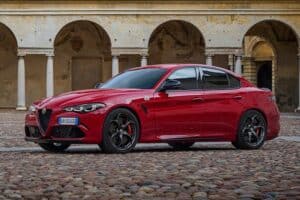If you are going to spend well over R1 million on a car, it might as well be very good. In fact, if I was spending this kind of money I would want to own a car that is top of its class.

You would think that money automatically buys you this title – but I can assure you this is not the case.
There are some fairly old technology, relatively slow (when compared to the competition) show boat cars wafting around to be had for millions of rands. The Audi RS 7 Sportback is not one of these.
One thing this full size, four-seater, five-door coupe will do is polarise enthusiasts when it comes to styling. You are either going to like the RS 7 for it’s unique styling or you are going to hate it from the word go.
I, for one, think the styling with the distinctive bumpers, high-gloss black honeycomb grille, as well as the add-on parts in matt aluminium, is cool and offers you a look that stands out from the norm.
Backing up this show is one seriously strong 4.0 litre TFSI V8 twin turbo powerplant that produces a very grumpy sounding 412kW of power between 5 700 and 6 600rpm and a tar crunching 700Nm of torque between 1 750 and 5 500rpm.
The RS 7 felt like it was making all of these numbers when I attended the car’s launch in the Western Cape – and our test car backed up this feeling by returning very quick times when I ran it at the Gerotek test facility just West of Pretoria.
The RS 7 jumped to 100km/h in a mere 4.35 seconds, a quarter mile in just over 12 seconds, went through the 1km mark at just under 250km/h and stopped shortly thereafter on its electronic speed limiter at 259km/h true top speed with the speedo reading 267km/h.
This was done without any launch control aid as the car runs an eight-speed Tiptronic box that does not feature this function.
Can you imagine if the RS 7 had launch control? Well, I tried to imagine this for one run by a left foot brake holding the car to build up some boost and rpm before I let it go: 100km/h came up in a stupid fast – for an almost two ton car – time of 3.83 seconds, the quarter mile in 11.86 seconds while the 1km mark was crossed at 252.22km/h.
There is a Dynamic Package Plus that sees the top speed now limited to 305km/h along with a harder non-electronically controlled adaptive suspension and ceramic brakes that adds R128 240 to the base price of R1 450 500 for the car.
These are performance numbers that would have the likes of a Nissan GT-R owner working way harder than he would want to in order to shake this Audi.
Of course, a high revving twin turbo V8 running at 1.2 bars of boost is going to require fuel to keep the fires burning. And lots of it.
Claimed fuel consumption figures in this high end segment are largely academic and never achieved – at least I never have managed to hit them and I doubt any normal owner will either.
The RS 7 comes with a start-stop system as standard along with innovative thermal management and further efficiency technology that sees cylinders 2, 3, 5 and 8 being shut down when not required, by closing their valves via electromechanical actuators.
This takes just a few hundredths of a second and occurs so smoothly and quickly I certainly couldn’t feel or hear the change.
Audi says the RS 7 Sportback will consume just 9.8 litres of fuel per 100km on average, but we know this is a Euro-based controlled computer test number. The reality was that I averaged 15.3 litres while I had the car, with the lowest I saw 10.6 litres while taking a gentle trundle to the office on the freeway.
But as good as a board room commuter the Audi RS 7 is, it real-ly comes alive on the open road and in the twisties. Yes, that is right: I am saying this RS 7 handles as good as the best cars in its class – but does so without the white knuckle ride and high levels of skill you would need to get the best out of the car.
This is largely thanks to the standard fitment of a properly dialled in quattro permanent all-wheel drive system that runs a centre differential with a high locking rate and separate oil cooler to regulate its temperature and sport differential at the rear.
It distributes the power as needed within a wide range between the front and rear axles, along with torque vectoring that supports the work of the differential at the cornering limit with minimal braking of the wheels that are under a reduced load.
Add to this dynamic package an interior that is class leading Audi – like always – along with almost every luxury you could think of, a five year or 100 000km full house Audi freeway maintenance plan, and you have a car that goes to the top of its class – and would be my pick.
Support Local Journalism
Add The Citizen as a Preferred Source on Google and follow us on Google News to see more of our trusted reporting in Google News and Top Stories.






